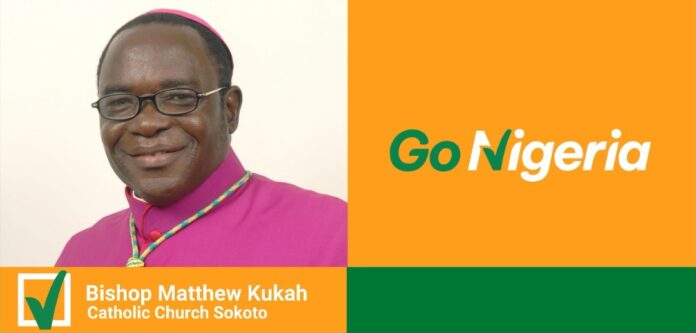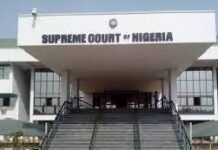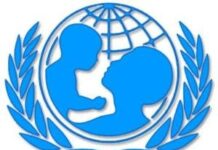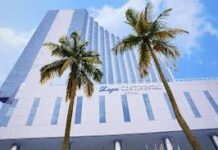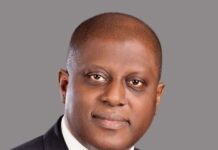.’We can reclaim our country from sliding to anarchy’
.President must withdraw pardon for Dariye, Nyame, uphold oath of office, says SERAP
Catholic Bishop of Sokoto Diocese, Bishop Matthew Hassan Kukah has criticized the inability of President Muhammadu Buhari-led federal government to tackle the rising wave of insecurity confronting the country.
He said that if genuine and urgent actions to halt the ever increasing wave of insecurity was not taken, Nigeria might be slide into anarchy.
The Bishop disclosed this at the Homily Family Cathedral, Sokoto in his Easter message to Nigerians, entitled, “To Mend A Broken Nation: The Easter Metaphor”.
According to him: “Nigerians can no longer recognise their country which has been battered and buffeted by men and women from the dark womb of time”.
Noting that our leaders seem to have gone into hibernation as the insecurity continues to rage on, Kukah said, “It is no longer necessary to ask how we got here. The real challenge is how to find the slippery rungs on the ladder of ascent so we can climb out. Yet, we ask, ascend to where?
He said, “One would be tempted to ask, what is there to say about our tragic situation today that has not been said? Who is there to speak that has not spoken”.
Drawing reference from the Biblical friends of Job, he said, “we stare at an imponderable tragedy as the nation unravels from all sides. The government has slid into hibernation mode. It is hard to know whether the problem is that those in power do not hear, see, feel, know, or just don’t care.
“Either way, from this crossroad, we must make a choice, to go forward, turn left or right or return home. None of these choices are easy, yet, guided by the light of the risen Christ, we can reclaim our country from its impending slide to anarchy”.
According to him, “The greatest challenge for Nigeria is not even the 2023 elections. It is the prospects for the reconciliation of our people. Here, the Buhari administration sadly has divided our people on the basis of ethnicity, religion, and region, in a way that we have never witnessed in our history.
“This carefully choreographed agenda has made Nigerians vulnerable and ignited the most divisive form of identity consciousness among our people. Years of friendships, cultural exchange, and collaboration built over time have now come under serious pressure from stereotyping.
“Notwithstanding these challenges, religious leaders must recover and deploy their moral authority and avoid falling victim to the schemes of politicians and their material enticements”.
A leader he argued must know when to call a Caesar a fox and not a horse, hence, “The welfare of citizens constitutes the cornerstone for measuring the legitimacy of any political leader. As such, religious leaders must focus more on the issues of welfare, safety and security of ordinary citizens. They must raise their voice when these rights are being trampled upon”.
In his admonition to Nigerians on why they should collectively think of how to rebuild the country to its lost glory, Kukah said, “The greatest challenge now is how to begin a process of reconstructing our nation, hoping that we can hang on and survive the 2023 elections.
“The real challenge before us now is to look beyond politics and face the challenge of forming character and faith in our country. Here, leaders of religion, Christianity and Islam, need to truthfully face the role of religion in the survival of our country. The Nigerian Constitution has very clearly delineated the fine boundaries between religion and politics. Yet many politicians continue to behave as if they are presiding over both the political and the spiritual realms in their states rather than governing in a democracy.”
On the role of interfaith dialogue, he, said it is sad that in Nigeria, many ill-equipped fraudsters are posing as religious leaders..
“Today, the values of Interfaith dialogue have come under severe strain and pressure with extremists from both sides of our faiths denigrating the idea of dialogue with their counterparts of other faiths. Ignorance and miseducation have combined with prejudice to create the falsehood that somehow, one religion is superior to the others.
“With so many ill equipped fraudsters posing as religious leaders, there is an obsession with defaming the others and widening our differences.
“Religious leaders must face the reality that here in Nigeria and elsewhere around the world, millions of people are leaving Christianity and Islam. While we are busy building walls of division with the blocks of prejudice, our members are becoming atheists but we prefer to pretend that we do not see this. We cannot pretend not to hear the footsteps of our faithful who are marching away into atheism and secularism. No threats can stop this, but dialogue can open our hearts.
“Thank God, in the last few years, we have had some good news from outside the shores of Nigeria. The most noteworthy is the initiative undertaken by both Pope Francis and the Grand Imam of Al-Azhar Mosque, Egypt, Shaikh Mohammed Al-Tayeb in 2019, when both of them met and signed the Document on Human Fraternity.
‘Pope Francis followed up with the publication of an Encyclical titled, Fratelli Tutti, We are all Brothers, in 2020. The following year, the United Nation’s General Assembly declared February 4, World Day of Fraternity.
“Both leaders agreed that: ‘We need to develop the awareness that nowadays, we are either all saved together or no one is saved. Poverty, decadence, and suffering in one part of the earth are a silent breeding ground for problems that will end up affecting our entire planet.
“We need to start thinking of a Nigeria beyond banditry and kidnapping and the endless circles of violence that have engulfed our communities and nation. We cannot continue to pretend that there are no religious undertones to the violence in the name of God that has given our religions a bad name. The way out is for the state to enforce the secular status of the Nigerian state so as to give citizens the necessary freedoms from the shackles of semi-feudal confusion over the status of religion and the state in a plural Democracy. We must be ready to embrace modernity and work out how to preserve our religions and cultures without turning religion into a tool for tyranny, exclusion, and oppression.
“In finding our way forward, the President must concede that it is within his powers to decide how we are going to end the war that has engulfed and is tearing down our nation. It seems that the federal government has shown far greater commitment to integrating so called repentant terrorists than getting our children back from kidnappers or keeping our universities open. Earlier last month, Operation Safe Corridor announced that it had graduated 599 members of various terrorist groups who have acquired new skills and are now ready to be integrated into society. The total comes to over a thousand now. It is plausible to note that the programme involves pyscho-social support, rehabilitation, vocational training, skill acquisition and start-ups.
“Despite all this, the larger issue is that their various communities have expressed their reluctance to receive their erring sons back. Nigerians have no access to the transcripts of the texts of the confessions of these terrorists not to talk of evidence of their commitment to not sin again. We have only the words of the terrorists and the same military that they have been fighting a war with.
“It speaks volumes when the President and his military hierarchy choose to believe these young men who took up arms and for years waged war against their country, killed, maimed and wasted thousands of lives, destroyed entire communities and now, they are being housed, fed, clothed with public funds. All this while their victims have been forced to make the various IDP camps their new homes! Where is the justice for the victims and the rest of the country they have destroyed?
“As a priest, I cannot be against a repentant sinner or criminals changing their ways. After all, the doors of forgiveness must always remain open. However, in this case, Nigerians have very little information as to the entire rehabilitation processes. Have these terrorists felt the heat or have they seen the light or, is their repentance a mere strategic and tactical repositioning? So far, we have no evidence that these terrorists have been able to confront their victims not to talk of seeking forgiveness from them.
“Something is wrong. We see these terrorists adorned in our national colours in their green and white kaftans, trousers, and looking like heroes of the state! Are we to assume that they have become acknowledged models for Nigerian youth? Perhaps the next graduating set might be treated to Presidential handshakes, receptions at the villa with full national colours!
“Only last week, as if in delayed solidarity, the Jama’atu Nasril Islam, JNI, in a Statement stated that: ‘It appears that the continuous callous acts of mayhem, killings and arson happening almost on daily or weekly bases around us; either within communities or on the roads we ply, has automatically reset our human psyche that we now have accepted such dastardly acts as part of our lives, to the extent that we no longer feel it….Any government that is incapable of protecting the lives of its citizens has lost the moral justification of being there in the first place….our humanity is being eroded and that erosion is become a new normal”
On why its very urgent to deploy joint efforts in fixing Nigeria, Kukah everything except corruption has literally broken down. Adding, “Our country has become one big emergency national hospital with full occupancy. Our individual hearts are broken. Our family dreams are broken. Homes are broken. Churches, Mosques, infrastructure are broken. Our educational system is broken. Our children’s lives and future are broken. Our politics is broken. Our economy is broken. Our energy system is broken. Our security system is broken. Our Roads and Rails are broken. Only corruption is alive and well.”
Appealing to Nigerians never to allow the tragedy that has afflicted all Nigerians to continue in whatever form, as 2023 gets closer, Bishop Kukah said, “The Presidency of Nigeria is not a human right based on ethnic, religious or regional sentiments.
“The next President of Nigeria must be a man or woman with a heart, a sense of empathy and a soul on fire that can set limits to what human indignities visited on citizens that he or she can tolerate.
“We have no need for any further empty messianic rhetoric laced with deceitful and grandiose religiousity. We need someone who can fix our broken nation, rid our people of the looming dangers of hunger and destitution.
“Our Presidential aspirants must show evidence from their legacies and antecedents that they know the country well enough and its severe wounds. Whoever wants to govern us must illustrate that he or she understands what has turned our nation into a national hospital and show us plans for our discharge from this horror”.
The Bishop who saluted President Muhammadu Buhari for accepting the report of the Committee on the Prerogative of Mercy and granting pardon to over 150 Nigerians serving various terms of imprisonment, added however that, “The more serious challenge is to immediately free all innocent Nigerians who are held captive and whose only crime is that they are living in Nigerians”, he said.
“With the news of the purchase of new sophisticated weapons, we hope that the President and the military will quickly roll out a strategy for routing this cancer that has afflicted our country. The general feeling is that the military has the capacity to end this tragedy. In reality, the military cannot fire beyond the radar set by their commander-in-chief. If the President can end this tragedy, he will immediately get the support of all citizens and hopefully leave office with his head held high”.
Clarifying reasons for his Messages in the last few years, Kukah said, it was borne out of a sense of moral revulsion over how life has been destroyed in his country.
“No country anywhere in the world is undergoing these self-inflicted wounds, citizens randomly murdering innocent citizens and getting away with it. For me as a Christian, there is a minimum threshold of human indignity that I can live with because the reason why Jesus came is so that all of us will have life and have it to the full
“We must shout at what diminishes any and every life in our society. Once human dignity is respected and restored, we will change our tone, but for now, our voice must have a sense of urgency.
In another development, Socio-Economic Rights and Accountability Project (SERAP) has urged President Muhammadu Buhari to use his “good offices to urgently review and withdraw the pardon granted to former governors of Plateau State, Senator Joshua Dariye, and Taraba State, Rev Jolly Nyame who are serving jail terms for corruption.”
SERAP is also urging him to “propose constitutional amendment to the National Assembly to reform the provisions on the exercise of the prerogative of mercy to make the provisions more transparent, and consistent and compatible with Nigeria’s international anti-corruption obligations.”
Mr Dariye and Mr Nyame were jailed for stealing N1.16bn and N1.6bn, respectively. However, the National Council of State last week endorsed the pardon of Mr Dariye, Mr Nyame and 157 others serving jail terms following the recommendations of the Presidential Advisory Committee on the Prerogative of Mercy.
In the letter dated 16 April, 2022 and signed by SERAP deputy director Kolawole Oluwadare, the organisation said: “Impunity for corruption will continue as long as influential politicians escape justice for their crimes. The constitutional power of prerogative of mercy ought not to be an instrument of impunity.”
SERAP said, “The pardon power ought to be exercised in a manner that is consistent with the Nigerian Constitution 1999 [as amended], particularly the provisions on oath of office by public officers, and section 15[5] which requires your government to abolish all corrupt practices and abuse of power.”
SERAP also said, “Indeed, the presidential pardon power must be exercised in good faith, and in line with the provisions of Chapter 4 of the Nigerian Constitution on fundamental rights.”
According to SERAP, “We would like your government to clarify if the pardon granted to Mr Dariye and Mr Nyame would entitle them to the return of the stolen assets already forfeited to the government.”
SERAP said, “The pardon also constitutes an interference in the exercise of judicial power. Because the pardon appears to be arbitrary, it undermines the authority and independence of the judiciary, and access to justice for victims of corruption.”
The letter, copied to the Conference of the States Parties to the United Nations Convention against Corruption, read in part: “The pardon is clearly inconsistent and incompatible with the requirements of the Nigerian Constitution, and the country’s international obligations including under the UN Convention against Corruption.”
“Presidential pardon for corruption cases is inconsistent with the rule of law, and the public interest, as it undermines the principle of equality before the law. It will undermine public confidence in your government’s fight against corruption, and the justice system.”
“SERAP is concerned that while the pardon power is routinely exercised to shield influential politicians and politically exposed persons from justice and accountability, ordinary people who have committed petty offences but with no money or influential politicians to speak for them, languish in prisons and are rarely considered for pardon.”
“While there is no doubt that Section 175 of the Constitution vests wide discretionary power in the Nigerian president to grant pardon, it does not stipulate the conditions under which such power should be exercised.”
“However, when section 15(5) of the Constitution is read together with the oath, it would seem to impose some ethical conditions on you to ensure that the exercise of the discretionary power of the prerogative of mercy is not such that it will encourage corruption or impunity of perpetrators.”
“Mr Dariye and Mr Nyame should have been allowed to complete their jail terms. The exercise of the presidential pardon in their cases would seem to be unfair and undeserving.”
“The investigation and prosecution of the corruption cases involving the pardoned former governors Dariye and Nyame reportedly cost over N300 millions of taxpayers’ money. The cases went from the High Court to the Supreme Court of Nigeria.”
“Section 15(5) of the Nigerian Constitution provides that ‘The State shall abolish all corrupt practices and abuse of power.’ Similarly, article 26 of the UN Convention against Corruption requires your government to ensure ‘effective, proportionate and dissuasive sanctions’ in cases of grand corruption.”
“Article 26 of the convention complements the more general requirement of article 30, paragraph 1, that sanctions must take into account the gravity of the corruption offences.”
“SERAP notes that in your inaugural speech on May 29, 2015 you stated that, ‘We are going to tackle pervasive corruption head on. Nigerians will not regret that they have entrusted national responsibility to us.’”
“However, the latest Transparency International’s Corruption Perception Index shows that Nigeria scored 24 out of 100 points, and ranked 154 out of 180 countries surveyed, falling back five places from the rank of 149 in 2020. This places Nigeria as the second most corrupt country in West Africa.”
“The pardon power, if properly exercised, can help to protect citizens against possible miscarriage of justice.”
“SERAP therefore urges you to urgently withdraw the presidential pardon granted to Mr Dariye and Mr Nyame, and to propose amendment to section 175 of the Nigerian Constitution that will make the exercise of the power to pardon more transparent and consistent and compatible with the country’s international obligations.”
“Any proposed amendment should also empower the citizens to challenge the legality of any arbitrary exercise of the power of prerogative of mercy.



